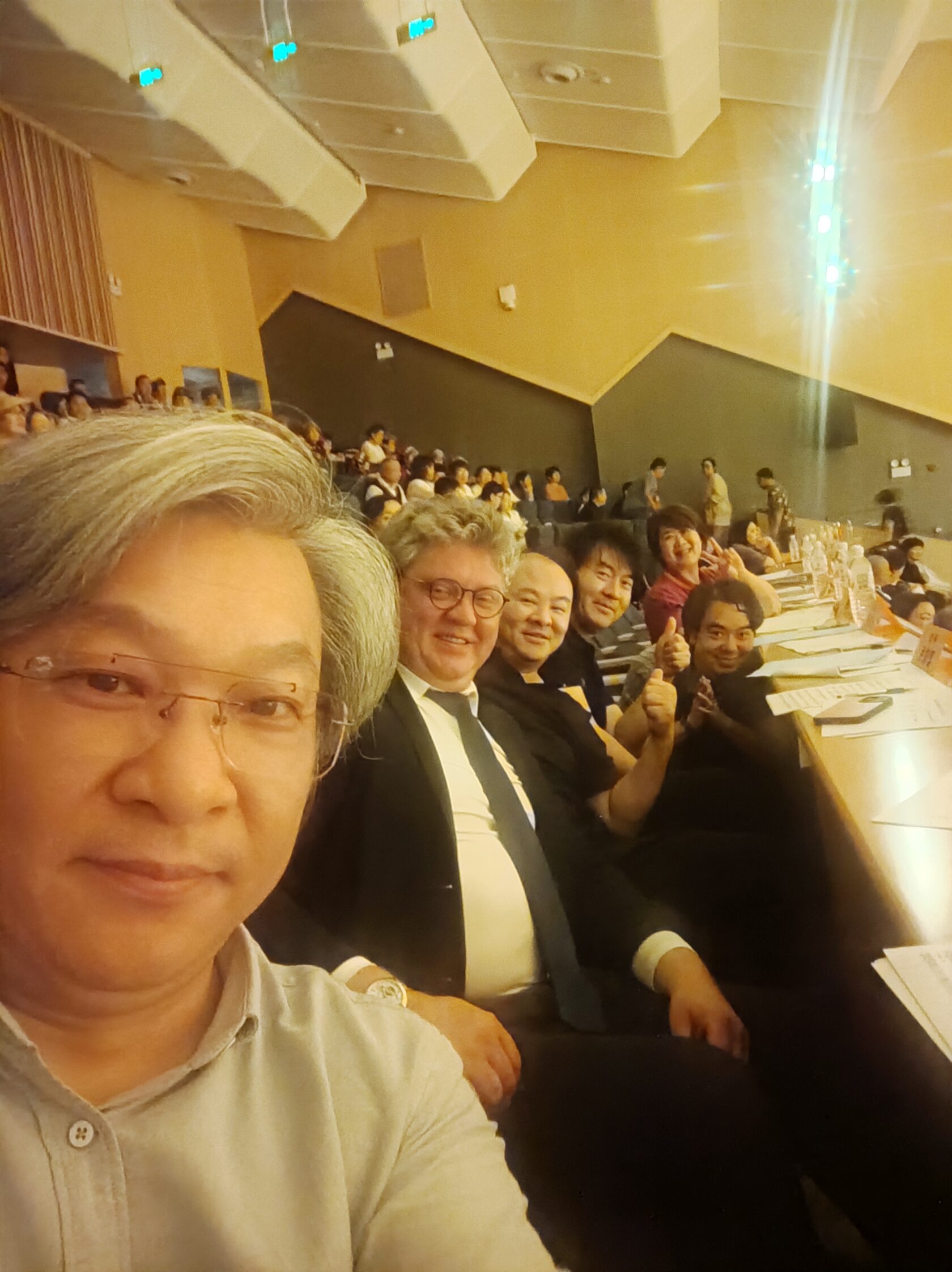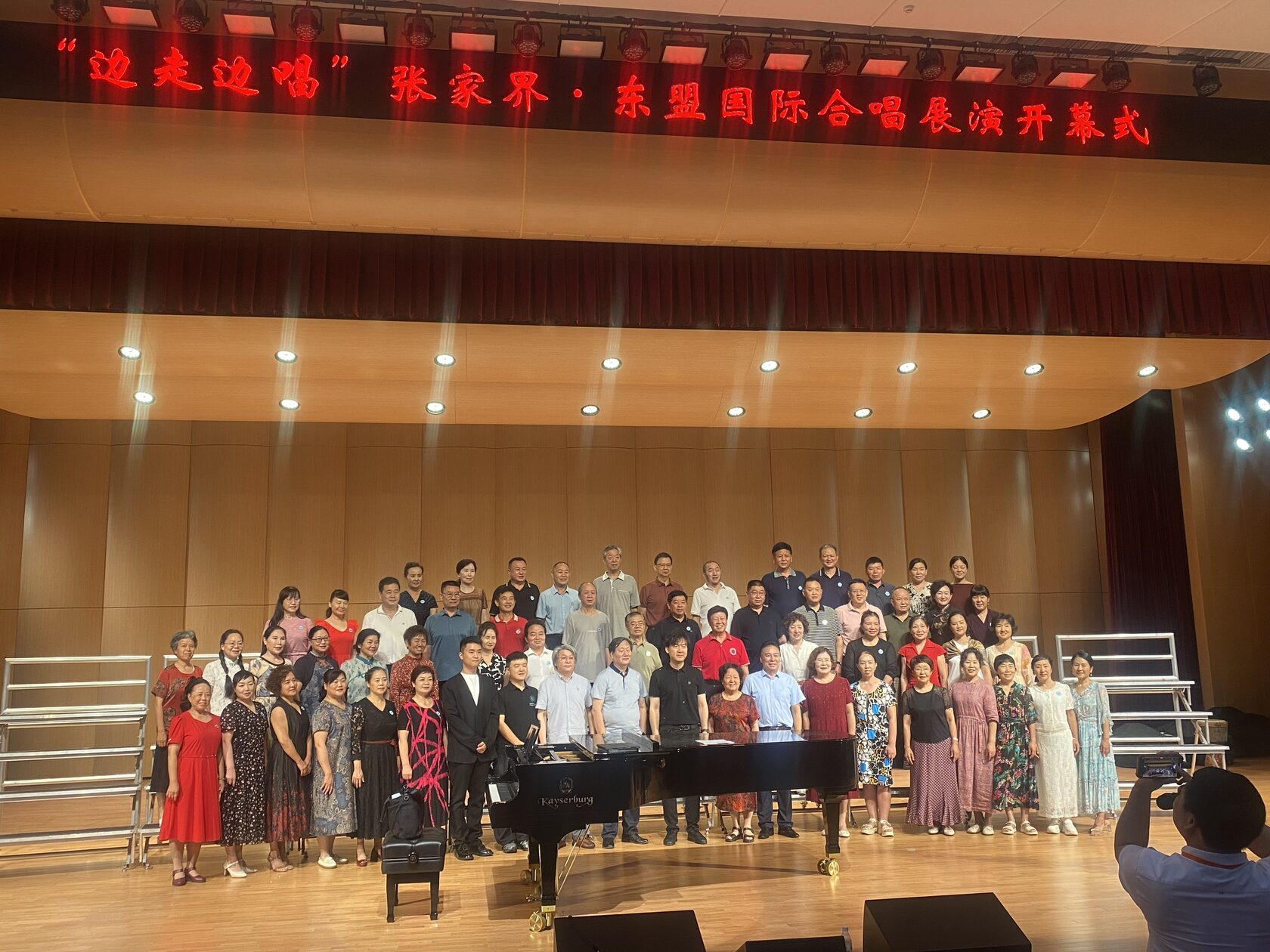
This event has brought together choirs from different provinces of China, festival guests, and esteemed jury members who will evaluate the choir performances in the competition.
The grand opening was marked by a performance from the International Symphony Orchestra of Zhangjiajie College. The orchestra played works by Chinese composers, accompanied by the college choir and soloist Wan Xiao Chen Yu. This musical presentation created a festive atmosphere and vividly demonstrated the richness of choral art.
After the musical performance, the festival organizers addressed the audience, including our leader, Jane Derbin. In his speech, he emphasized the importance of choral art in Chinese culture and traditions. According to Jane Derbin, choral art has deep historical roots and serves not only as a means of self-expression but also as a way to unite society. He noted that choral singing promotes understanding and friendship between people of different ages and social groups.
Jane Derbin also highlighted that choral art plays a significant role in education. At Zhangjiajie College, choral ensembles contribute to developing young people's creative skills and fostering a sense of collectivism, which, in turn, strengthens students' confidence. Thus, choral art becomes a powerful tool for interaction between different cultures and peoples.
The grand opening was marked by a performance from the International Symphony Orchestra of Zhangjiajie College. The orchestra played works by Chinese composers, accompanied by the college choir and soloist Wan Xiao Chen Yu. This musical presentation created a festive atmosphere and vividly demonstrated the richness of choral art.
After the musical performance, the festival organizers addressed the audience, including our leader, Jane Derbin. In his speech, he emphasized the importance of choral art in Chinese culture and traditions. According to Jane Derbin, choral art has deep historical roots and serves not only as a means of self-expression but also as a way to unite society. He noted that choral singing promotes understanding and friendship between people of different ages and social groups.
Jane Derbin also highlighted that choral art plays a significant role in education. At Zhangjiajie College, choral ensembles contribute to developing young people's creative skills and fostering a sense of collectivism, which, in turn, strengthens students' confidence. Thus, choral art becomes a powerful tool for interaction between different cultures and peoples.

Following the official part of the event, workshops with the jury members took place. Teacher Zhu Xi conducted an analysis of the Zhangjiajie College choir's performance, focusing on word articulation and proper sound delivery. Teacher She Jia Lin provided advice to the choir directly under the administration of the Chanzhi Choral Association from Shanxi Province. He concentrated on aspects such as breathing and phrasing, emphasizing their importance for achieving quality choral sound production.
Dr. Mao Yong, who worked with the "Jiayin" choir from Shaanxi Province, gave an interesting lecture on sound visualization. His exercises captivated audiences, showcasing new approaches to choral singing.
The first half of the day concluded with Teacher Dou Tiemin, who shared his experience working with the choir "on Tianmen Mountain" in Zhangjiajie.
This wonderful cultural event will continue to delight us over the coming days.
Dr. Mao Yong, who worked with the "Jiayin" choir from Shaanxi Province, gave an interesting lecture on sound visualization. His exercises captivated audiences, showcasing new approaches to choral singing.
The first half of the day concluded with Teacher Dou Tiemin, who shared his experience working with the choir "on Tianmen Mountain" in Zhangjiajie.
This wonderful cultural event will continue to delight us over the coming days.

In the afternoon of July 9, during the Zhangjiajie-ASEAN International Choral Exhibition (张家界·东盟国际合唱展), children’s choirs performed to an enthusiastic audience. This festival became a vibrant event, where not only the young performers took center stage, but also their mentors, notably Professor Zhen Baoping and Dr. Mao Yong. Their profound knowledge and experience helped the participants understand the significance of nurturing vocal skills from an early age.

The Impact of Early Musical Education
Professor Zhen Baoping shared his thoughts on the importance of developing singing abilities from a young age. He remarked, "We are all born, and the first thing a child utters is a cry." He believes that this natural form of sound production is the most correct. As individuals grow, they must learn to manage their sound expressions, transforming a cry into a controlled form of communication.
A newborn's cry is a primary signal of life, allowing the child to express their needs and attract the attention of those around them. Over time, individuals learn to control their voice, becoming a vital skill for conveying emotions and information. However, voice management encompasses more than just a technical aspect; upbringing and cultural environment also play crucial roles in developing sound skills, connecting us with our emotions and each other.
Professor Zhen Baoping shared his thoughts on the importance of developing singing abilities from a young age. He remarked, "We are all born, and the first thing a child utters is a cry." He believes that this natural form of sound production is the most correct. As individuals grow, they must learn to manage their sound expressions, transforming a cry into a controlled form of communication.
A newborn's cry is a primary signal of life, allowing the child to express their needs and attract the attention of those around them. Over time, individuals learn to control their voice, becoming a vital skill for conveying emotions and information. However, voice management encompasses more than just a technical aspect; upbringing and cultural environment also play crucial roles in developing sound skills, connecting us with our emotions and each other.

Dr. Mao Yong's Unique Work with Children's Choirs
The next speaker at the event was Dr. Mao Yong, who inspired the audience with his professionalism and unique approach to education. The work of a choral conductor with children's choirs requires a blend of musical education and upbringing through art. One important aspect of this field is the correct breathing and voice technique, which is also achieved through playful methods.
Proper breathing is the foundation of any vocal performance, and for children just beginning their musical journey, understanding how to use their breathing mechanisms can be challenging. Thus, the conductor employs various methods to explain and practice breathing techniques. Playful approaches in this process make learning more accessible and engaging, fostering a positive atmosphere.
Playful Methods as a Tool for Learning
Games not only develop the voice and breathing but also enhance musical ear and help liberate personality. Playful methods in the conductor's work make the learning process more comfortable and effective. Establishing breathing and voice techniques through games opens new horizons in music for children, allowing them to express themselves and develop their creative abilities.
Ultimately, such educational methodology not only forms singing skills but also creates a positive attitude towards music as an art form that children can dedicate their lives to. The Zhangjiajie-ASEAN International Choral Festival has become a vivid example of the importance of working with future musicians and its impact on the development of each child's creative personality.
In conclusion, the Zhangjiajie-ASEAN International Choral Festival stands as a vibrant celebration of choral art and its profound role in personal and cultural expression. This inaugural event has successfully gathered diverse choirs and esteemed educators, fostering an environment where musicianship and creativity can flourish. The performances, workshops, and discussions throughout the festival echo the sentiments expressed by Jane Derbin about the historical and contemporary significance of choral singing in uniting people and enhancing educational practices.
The next speaker at the event was Dr. Mao Yong, who inspired the audience with his professionalism and unique approach to education. The work of a choral conductor with children's choirs requires a blend of musical education and upbringing through art. One important aspect of this field is the correct breathing and voice technique, which is also achieved through playful methods.
Proper breathing is the foundation of any vocal performance, and for children just beginning their musical journey, understanding how to use their breathing mechanisms can be challenging. Thus, the conductor employs various methods to explain and practice breathing techniques. Playful approaches in this process make learning more accessible and engaging, fostering a positive atmosphere.
Playful Methods as a Tool for Learning
Games not only develop the voice and breathing but also enhance musical ear and help liberate personality. Playful methods in the conductor's work make the learning process more comfortable and effective. Establishing breathing and voice techniques through games opens new horizons in music for children, allowing them to express themselves and develop their creative abilities.
Ultimately, such educational methodology not only forms singing skills but also creates a positive attitude towards music as an art form that children can dedicate their lives to. The Zhangjiajie-ASEAN International Choral Festival has become a vivid example of the importance of working with future musicians and its impact on the development of each child's creative personality.
In conclusion, the Zhangjiajie-ASEAN International Choral Festival stands as a vibrant celebration of choral art and its profound role in personal and cultural expression. This inaugural event has successfully gathered diverse choirs and esteemed educators, fostering an environment where musicianship and creativity can flourish. The performances, workshops, and discussions throughout the festival echo the sentiments expressed by Jane Derbin about the historical and contemporary significance of choral singing in uniting people and enhancing educational practices.
The emphasis on early musical education, as highlighted by Professor Zhen Baoping and Dr. Mao Yong, reinforces the notion that nurturing vocal skills from a young age is crucial for emotional expression and communication. Their innovative and playful methodologies showcase the power of music as a tool for personal development, empowering children to convey their emotions while instilling a lifelong love of singing.
As we look forward to the upcoming days of the festival, we are reminded of the transformative power of music and its ability to connect individuals across cultures and generations. The Zhangjiajie-ASEAN International Choral Festival not only enriches the local community but also leaves a lasting impact on the future of choral music and education.
The festival ended with a solemn ceremony of awarding prizes to the winners of the choir competition held as part of the festival. I am very pleased that the first prize was awarded to the choir of our college. Without false modesty I will say that the work of our choir really surpassed all the presented groups and became an indicative moment of this festival.
In conclusion, I would like to congratulate all the winners and participants of the contest-festival on their successful participation in this wonderful festival!
Choral art is a great form of self-expression, and your performances proved that music really unites us, helps us to feel and understand each other on a deep level.
I hope that this experience will inspire you for further creative work and new achievements in your musical activities. May every chord, every solo and every choral performance fill your life with joy and inspiration.
We wish you a wonderful mood, creative success and see you next time! May your voices sound wherever you are and continue to give joy to all who listen to you!
As we look forward to the upcoming days of the festival, we are reminded of the transformative power of music and its ability to connect individuals across cultures and generations. The Zhangjiajie-ASEAN International Choral Festival not only enriches the local community but also leaves a lasting impact on the future of choral music and education.
The festival ended with a solemn ceremony of awarding prizes to the winners of the choir competition held as part of the festival. I am very pleased that the first prize was awarded to the choir of our college. Without false modesty I will say that the work of our choir really surpassed all the presented groups and became an indicative moment of this festival.
In conclusion, I would like to congratulate all the winners and participants of the contest-festival on their successful participation in this wonderful festival!
Choral art is a great form of self-expression, and your performances proved that music really unites us, helps us to feel and understand each other on a deep level.
I hope that this experience will inspire you for further creative work and new achievements in your musical activities. May every chord, every solo and every choral performance fill your life with joy and inspiration.
We wish you a wonderful mood, creative success and see you next time! May your voices sound wherever you are and continue to give joy to all who listen to you!



